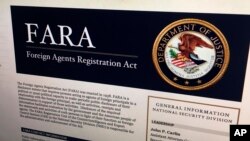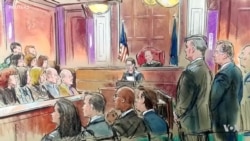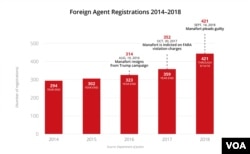They used to operate in the shadows, but increasingly, foreign lobbyists and influence peddlers are revealing their activities as the U.S. Justice Department steps up enforcement of the little-known Foreign Agents Registration Act (FARA).
The law, enacted in 1938 to counter Nazi propaganda, requires public relations professionals, law firms and others working on behalf of foreign governments in the United States to register with the Justice Department and report on their efforts every six months. Many lobbyists chose to ignore the requirement, because of lax enforcement and oversight in the past, but the special counsel's use of the law during the Russia investigation to prosecute violators has changed that.
WATCH: Manafort Trial Puts Spotlight on Lobbyists
Voluntary compliance with the law has spiked since 2016, when former Donald Trump presidential campaign chairman Paul Manafort's past lobbying efforts for Ukrainian politicians came to light. FARA registrations picked up further after Manafort and his former business partner, Rick Gates, were indicted last October on a slew of charges, including FARA violations.
Data from the Justice Department show the number of active FARA registrants with the agency has surged to 422 this week, up 24 percent since October and 35 percent higher than late 2016 levels. For nearly two decades prior to 2014, the number had been falling.
Aggressive enforcement
David Laufman, a Washington lawyer who advises companies and individuals on FARA compliance, said the surge has been driven in part by the Justice Department's aggressive enforcement of the law and increased participation by prominent consulting and lobbying firms.
"All of these combined to create an understanding and awareness on the part of lawyers representing companies in FARA matters that it's a new day at the Department of Justice for FARA enforcement and that there is heightened risk for companies that evade their registration obligations," said Laufman, who was in charge of FARA enforcement at the Justice Department from late 2014 to early 2018.
The Justice Department's enhanced enforcement of FARA includes both bringing criminal prosecutions and getting companies and individuals to comply voluntarily.
Before the Gates and Manafort indictments, the department had prosecuted just seven FARA cases in the 50 years since the statute was enacted. Since then, it has brought five more, including four by special counsel Robert Mueller's office.
Among them:
— Manafort pleaded guilty on Friday to two counts, including conspiracy against the United States an umbrella charge that includes FARA violations.
— In February, Gates pleaded guilty to two charges, including conspiracy to violate FARA.
— Also in February, the special counsel charged a Russian troll factory and a dozen Russian operatives with FARA violations, among other charges.
— In May, Pakistani national and U.S. permanent resident Nisar Ahmed Chaudry pleaded guilty to failure to file a foreign registration statement in connection with efforts to influence think tanks.
— And in August, Samuel Patten, a former consultant for Ukraine, pleaded guilty of failing to register as a foreign agent.
Because all criminal charges brought by the special counsel must first be approved by the Justice Department, Laufman said the recent FARA cases "should be viewed broadly as Department of Justice prosecutions in the vessel of the special counsel's office."
Laufman said he expected the uptick in new FARA registrations to continue.
"I don't know about the special counsel, but it's reasonable to expect the Department of Justice to keep its foot on the gas pedal with respect to FARA enforcement," he said. "When appropriate cases present themselves for criminal investigation and prosecution, I do continue to expect more FARA prosecutions by the department."
Toughened compliance
Joshua Rosenstein, a partner with the Washington law firm of Sandler Reiff Lamb Rosenstein & Birkenstock, said the Justice Department's FARA unit has toughened compliance in part in response to a critical 2016 audit by the agency's inspector general.
"Normally what would happen, when the FARA unit feels someone needs to register, they send a letter, wait for a response and then negotiate some sort of resolution," Rosenstein said. "Just the sheer volume of those inquiry letters, in my experience, has increased certainly over the last year, but even in the year and two before that."
According to the inspector general audit, the FARA unit issued about 130 letters of inquiry to potential registrants over 10 years. Laufman said the number has increased since.
Lydia Dennett, a FARA expert at the Project on Government Oversight in Washington, said loopholes in the law make it difficult for the Justice Department to monitor and detect foreign influence operations.
But Dennett said there is an effort underway in Congress to broaden the scope and enforcement of FARA, including giving the Justice Department greater investigative authority and the ability to levy civil penalties against violators.
"The congressional interest in reforming the law ... is great and very much needed to modernize it, bring it into the digital age and really clarify where it's vague as to what is required," she said.








